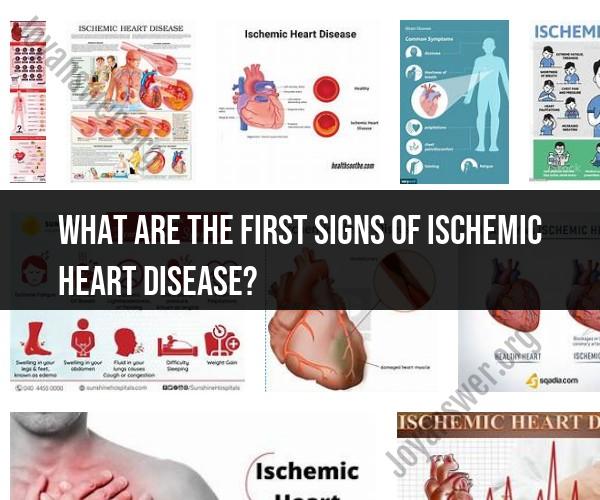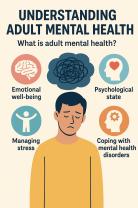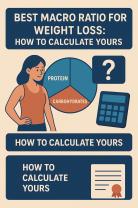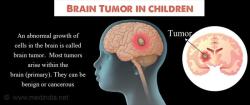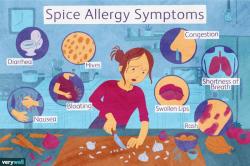What are the first signs of ischemic heart disease?
Ischemic heart disease (IHD), also known as coronary artery disease (CAD) or coronary heart disease (CHD), develops gradually over time, and its early signs may be subtle or go unnoticed. However, recognizing these early signs is crucial because they can indicate an increased risk of heart problems. Here are some of the early signs and symptoms of ischemic heart disease:
Angina (Chest Pain or Discomfort):
- The most common early symptom is angina, which is often described as a tightness, pressure, or burning sensation in the chest.
- Angina typically occurs during physical activity, emotional stress, or after a heavy meal and is relieved by rest or nitroglycerin.
Shortness of Breath (Dyspnea):
- Feeling out of breath or experiencing difficulty breathing, especially during physical exertion, can be an early sign.
- Shortness of breath may be accompanied by fatigue or weakness.
Fatigue:
- Unexplained fatigue, especially if it occurs with other symptoms, can be an early sign of reduced blood flow to the heart muscle.
Heartburn or Indigestion:
- Some people mistake the discomfort of angina for heartburn or indigestion.
- If antacids do not relieve the discomfort, or if it is associated with other symptoms, it may be related to IHD.
Pain in Other Areas of the Upper Body:
- Pain, discomfort, or a burning sensation may radiate from the chest to the arms (especially the left arm), neck, jaw, shoulder blades, or back.
Nausea or Vomiting:
- Some people with IHD experience nausea or vomiting, often in association with other symptoms.
Sweating:
- Profuse sweating, especially when it is not explained by activity or temperature, can be an early sign of IHD.
Risk Factors:
- Having risk factors such as high blood pressure, high cholesterol levels, diabetes, obesity, smoking, a family history of heart disease, or a sedentary lifestyle can increase your risk of developing IHD. Monitoring these risk factors and seeking medical advice can help detect and manage IHD at an earlier stage.
It's important to note that these early signs and symptoms can vary from person to person, and some individuals with IHD may not experience any noticeable symptoms until the condition has progressed significantly. Therefore, if you have any concerns about your heart health or if you experience any of these symptoms, it's crucial to seek medical attention promptly. Early detection and management can significantly improve outcomes and reduce the risk of serious heart-related events, such as heart attacks.
Detecting Ischemic Heart Disease: Early Warning Signs and Symptoms
Ischemic heart disease (IHD), also known as coronary artery disease, is a condition in which the blood supply to the heart muscle is reduced. This can be caused by a number of factors, including atherosclerosis (plaque buildup in the arteries), blood clots, and spasms of the coronary arteries.
IHD can cause a variety of symptoms, including:
- Chest pain (angina): Angina is the most common symptom of IHD. It is typically described as a feeling of pressure, tightness, or squeezing in the chest. Angina can be triggered by physical exertion, emotional stress, or cold weather.
- Shortness of breath: Shortness of breath can occur with or without chest pain. It is often worse with exertion.
- Fatigue: Fatigue is another common symptom of IHD. People with IHD may feel tired even after getting enough sleep.
- Palpitations: Palpitations are a feeling that the heart is racing or pounding. They can be caused by a number of things, including IHD.
- Dizziness or fainting: Dizziness or fainting can occur if the heart is not getting enough blood.
In some cases, IHD may not cause any symptoms. This is known as silent ischemia. Silent ischemia can be dangerous because it can lead to a heart attack without warning.
Your Heart's Health: Recognizing the Initial Symptoms of Ischemic Heart Disease
It is important to recognize the early warning signs and symptoms of ischemic heart disease (IHD) so that you can seek medical attention promptly. IHD is a serious condition, but it can be managed with treatment.
If you experience any of the following symptoms, it is important to see a doctor right away:
- Chest pain that is new, unusual, or severe
- Shortness of breath that is new, unusual, or severe
- Fatigue that is new, unusual, or severe
- Palpitations that are new, unusual, or severe
- Dizziness or fainting
Cardiac Concerns: Identifying Early Indications of Ischemic Heart Disease
If you have any risk factors for IHD, such as high cholesterol, high blood pressure, diabetes, or smoking, it is important to be aware of the early warning signs and symptoms of the condition.
Risk factors for IHD include:
- Age: Men over 45 and women over 55 are at higher risk for IHD.
- Family history: People with a family history of IHD are at higher risk.
- High cholesterol: High cholesterol levels can lead to plaque buildup in the arteries.
- High blood pressure: High blood pressure can damage the arteries.
- Diabetes: Diabetes can damage the arteries and nerves that control the heart.
- Smoking: Smoking damages the arteries and increases the risk of blood clots.
If you have any of these risk factors, it is important to talk to your doctor about ways to reduce your risk of IHD.
If you experience any of the early warning signs and symptoms of IHD, it is important to see a doctor right away. Early diagnosis and treatment of IHD can help to prevent heart attack and other serious complications.
